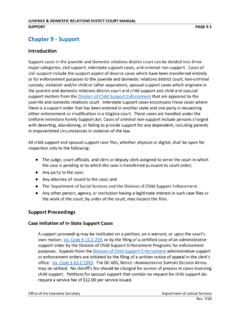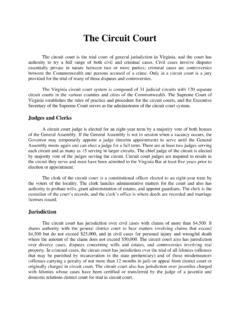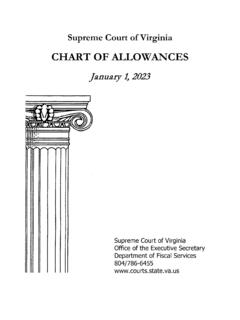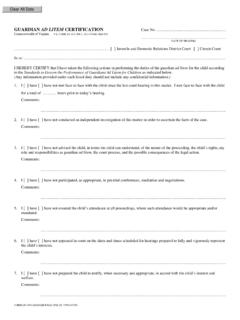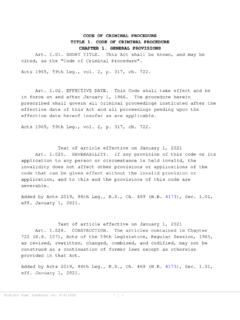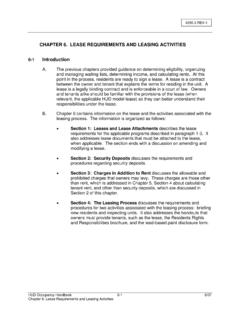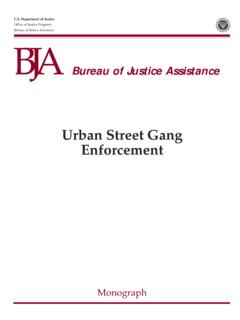Transcription of MAGISTRATE MANUAL - SEARCH WARRANT PROCEDURES …
1 MAGISTRATE MANUAL SEARCH WARRANT PROCEDURES PAGE 5-1 Office of the Executive Secretary Department of MAGISTRATE Services Rev: 7/21 chapter 5 - SEARCH WARRANT PROCEDURES I. INTRODUCTION There are two types of searches. The first deals with the traditional SEARCH for purposes of obtaining evidence for use in a criminal trial. The second deals with administrative searches and concerns itself with inspections such as fire, hazardous materials, health, and safety matters. This chapter discusses both types of searches.
2 II. criminal SEARCHES A SEARCH , for Fourth Amendment purposes, involves a government intrusion upon a person s reasonable expectation of privacy or a physical intrusion on an individual s person, houses, papers, or effects for the purpose of obtaining information. United States v. Jones, 565 101259 (2012). Before the decision in Katz v. , 389 347 (1967) (adding the reasonable- expectation-of-privacy test to the common law trespassory test), the government intrusion had to be a physical intrusion in order to be regarded as a SEARCH .
3 This requirement for a physical intrusion was easily defined and easily understood, but it led to some undesirable results. As technology advanced, electronic listening devices were developed making it possible for the government to monitor conversations in an individual s dwelling without ever physically intruding into that dwelling. Thus, in Katz, the Supreme Court was confronted with a factual situation in which the police, without a SEARCH WARRANT , had placed electronic listening devices on the outside of a telephone booth and were able to overhear the conversation without making a physical intrusion.
4 In Katz, the court held that the Constitution (Fourth Amendment) is not designed merely to protect against physical trespass, it is designed to protect the right of privacy. The Fourth Amendment protects people, not places. What a person knowingly exposes to the public, even in his own house, is not a subject of Fourth Amendment protection.. But what he seeks to preserve as private, even in an area accessible to the public, may be constitutionally protected. Thus in Katz, the court abandoned the technical analysis of whether there was a physical intrusion and substituted the more theoretical or general analysis of whether there was an invasion of a reasonable expectation of privacy.
5 This is a reflection of the basic concept regarding fair play and justice. The court recognized that the Fourth Amendment serves as a limitation on the power of the government, and this limitation cannot be undermined by technological gadgetry. Both the Virginia Constitution (Article I, Section 10) and the United States Constitution (Amendment IV) forbid the issuance of SEARCH warrants, which are not based upon probable cause. The reason is obvious. People should be secure in the possession of their homes and property from unjustified intrusions.
6 The abuse of this right by British authorities in issuing general SEARCH warrants called writs of assistance contributed to the American Revolution and led to the enactments of the safeguards of the Virginia and United States Constitutions. MAGISTRATE MANUAL SEARCH WARRANT PROCEDURES PAGE 5-2 Office of the Executive Secretary Department of MAGISTRATE Services Rev: 7/21 The MAGISTRATE must keep in mind that the issuance of a SEARCH WARRANT , sets aside, to some extent, an individual s right to privacy. The right to privacy is not an absolute right; it must be balanced against society s right to obtain evidence of a crime.
7 For these reasons, there are very strict provisions regulating the issuance of SEARCH warrants. A failure to comply with these provisions may result in serious consequences, both for the judicial officer issuing the WARRANT and for the Commonwealth. A MAGISTRATE who willfully fails to observe the proper procedure may be found guilty of malfeasance and is subject to removal from office. He may be liable in money damages, in some instances, to a party injured by the illegal SEARCH (Williams v. Kozak, 280 Fed. 373 (4th Cir.))
8 1922)). Perhaps more importantly, a miscarriage of justice may result, in that evidence seized from an obviously guilty person may not be later admitted in court if the SEARCH WARRANT is illegal. III. VIRGINIA STATUTES ON SEARCH WARRANTS The following statutes, listed below, set forth PROCEDURES for criminal SEARCH warrants. There are other types of SEARCH warrants, inspection warrants, and investigative warrants set forth in the Code of Virginia. Probable cause hearings for criminal SEARCH warrants are the most common type of SEARCH hearing that a MAGISTRATE conducts.
9 While probable cause determination for administrative, inspection or investigative warrants is the same as for general criminal SEARCH warrants, PROCEDURES vary considerably. Virginia Code states: When an affidavit is made under oath before a MAGISTRATE or court of competent jurisdiction by any animal control officer, humane investigator, law-enforcement officer, or State Veterinarian s representative that the complainant believes and has reasonable cause to believe that the laws in relation to cruelty to animals have been, are being, or are about to be violated in any particular building or place, such MAGISTRATE or judge, if satisfied that there is reasonable cause for such belief.
10 Shall issue a WARRANT authorizing any sheriff, deputy sheriff, or police officer, to SEARCH the building or place. After issuing a WARRANT under this section, the MAGISTRATE or judge shall file the affidavit in the manner prescribed by After executing the WARRANT , the animal control officer, humane investigator, law-enforcement officer, or State Veterinarian's representative shall return the WARRANT to the clerk of the circuit court of the city or county wherein the SEARCH was made. Virginia Code states: A.

